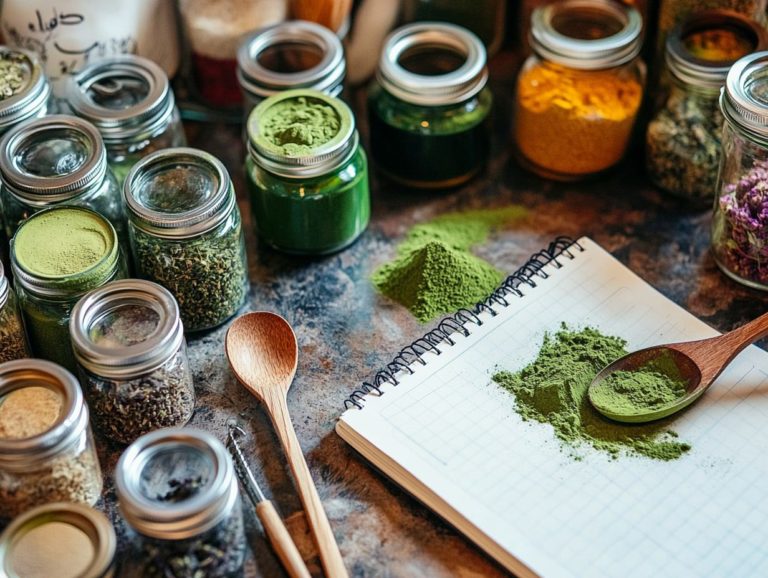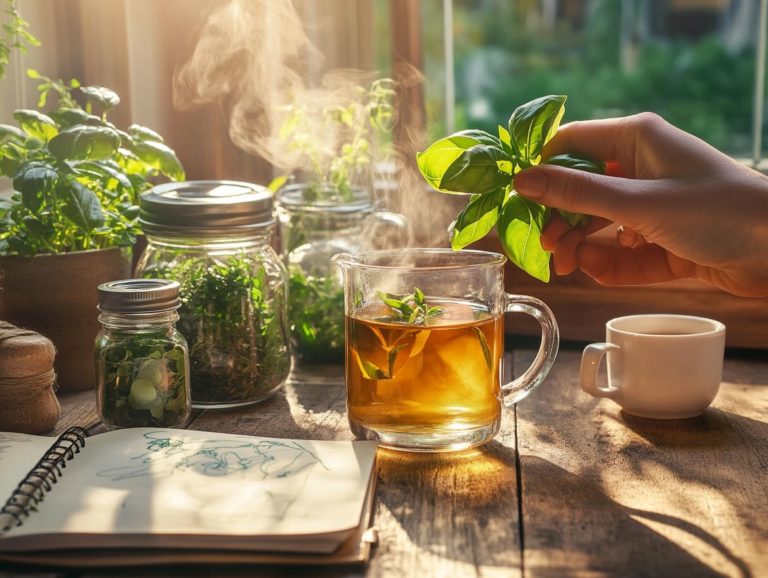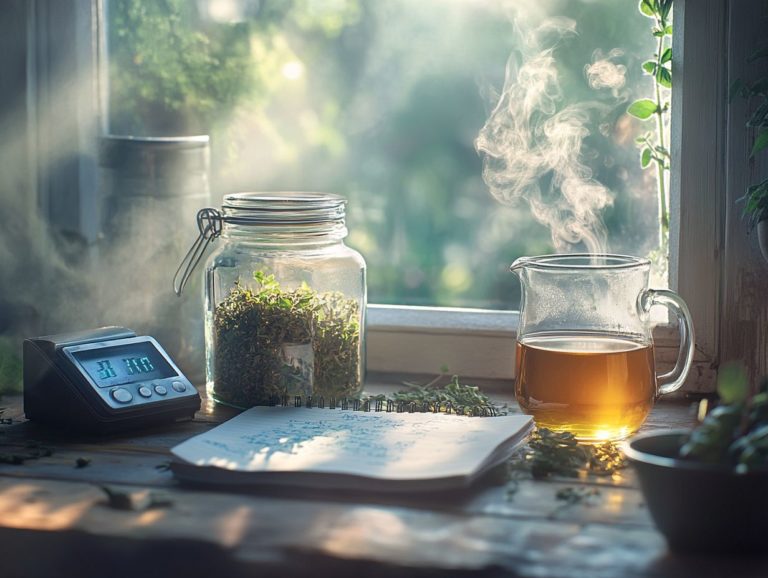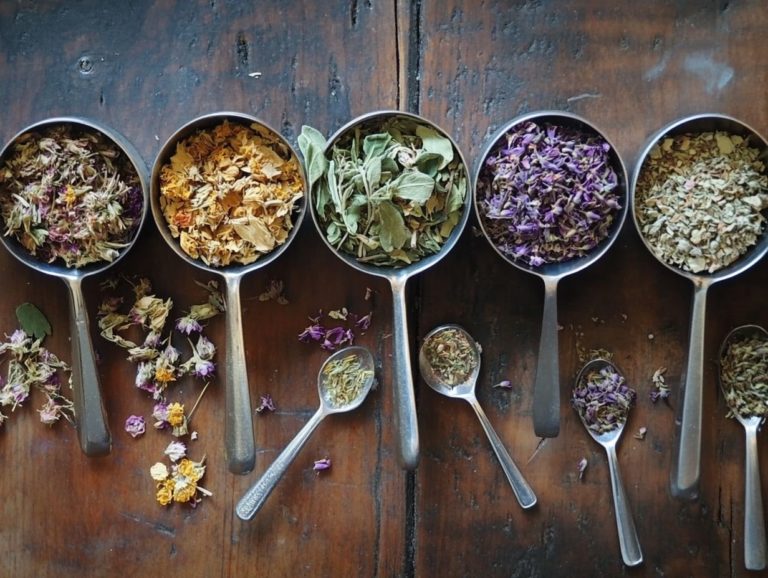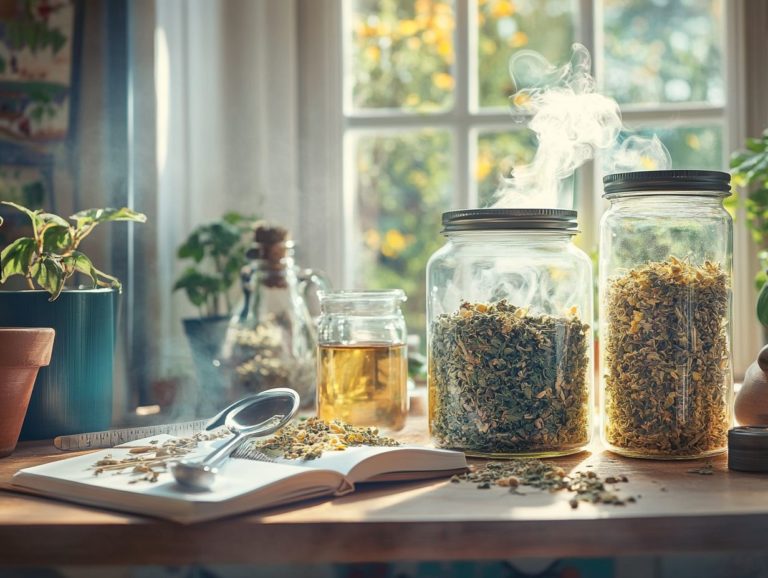Herbs That Require Precise Dosage Monitoring
Herbal remedies have become increasingly popular for their potential health benefits. Understanding the importance of dosage is key to safely enjoying herbal remedies.
Some herbs, such as St. John’s Wort and Valerian Root, necessitate careful monitoring to ensure both effectiveness and safety.
This discussion will delve into fifteen herbs that require precise dosing, explore the risks associated with improper usage, and provide guidance on how to use them safely.
Whether you’re a seasoned herbalist or a curious beginner, this information is essential for empowering you to make informed choices about your health.
Contents
- Key Takeaways:
- 1. St. John’s Wort
- 2. Kava
- 3. Ginkgo Biloba
- 4. Valerian Root
- 5. Echinacea
- 6. Black Cohosh
- 7. Saw Palmetto
- 8. Milk Thistle
- 9. Eucalyptus
- 10. Chamomile
- 11. Garlic
- 12. Goldenseal
- 13. Ginger
- 14. Turmeric
- 15. Licorice Root
- Why Is Precise Dosage Monitoring Important for These Herbs?
- Frequently Asked Questions
- 1. What are some examples of herbs that require precise dosage monitoring?
- 2. Why is it important to monitor the dosage of these herbs?
- 3. What can happen if I take too much of these herbs?
- 4. Are there any specific populations who may be more sensitive to these herbs?
- 5. Can I mix these herbs with other medications?
- 6. What should I do if I accidentally take too much of these herbs?
Key Takeaways:
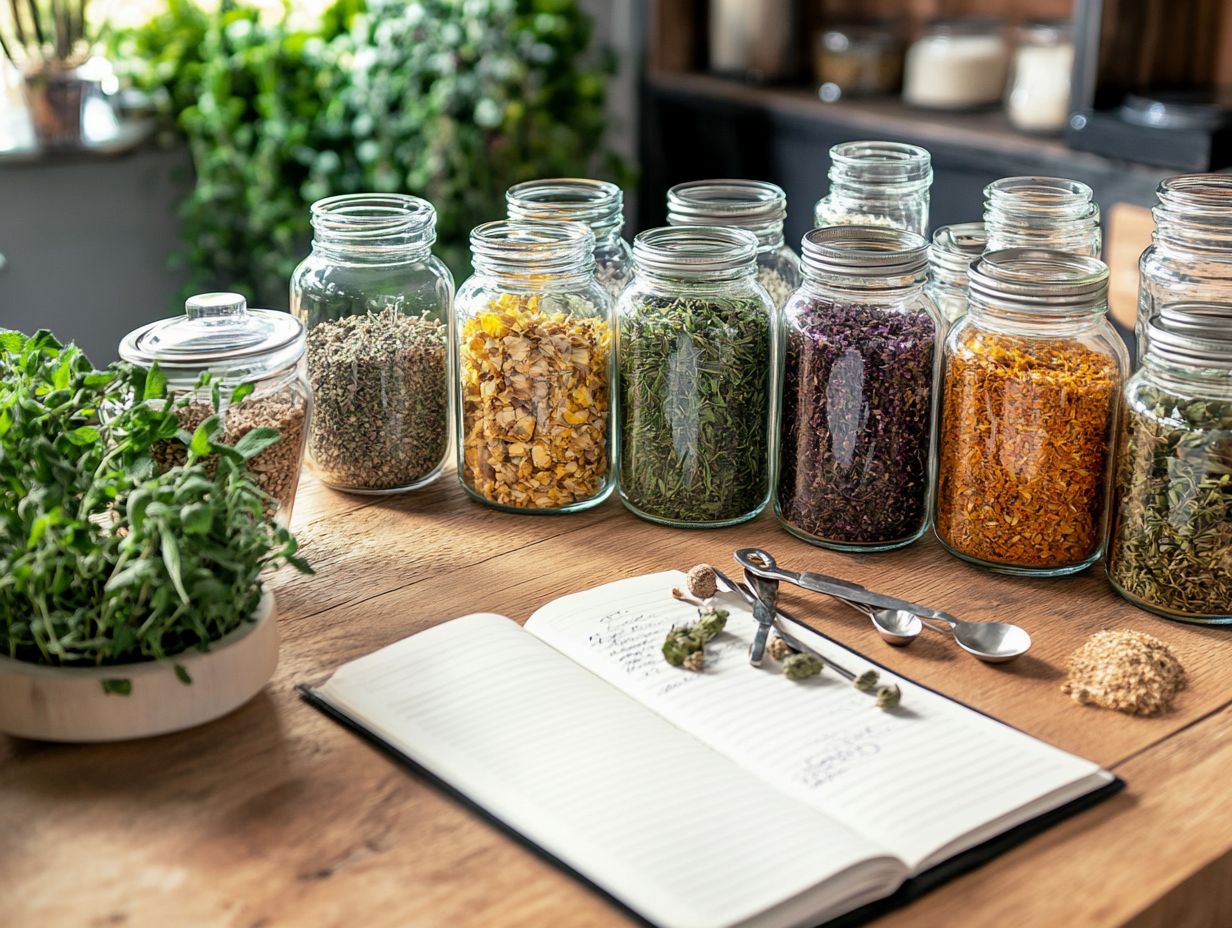
- Precise dosage monitoring is crucial for herbs like St. John’s Wort, Kava, and Ginkgo Biloba due to potential risks of incorrect dosage.
- Improper dosing of Valerian Root, Echinacea, and Black Cohosh can lead to adverse reactions or reduced effectiveness.
- It is important to consult with a healthcare professional and carefully follow dosage instructions when using Milk Thistle, Eucalyptus, and Chamomile.
1. St. John’s Wort
St. John’s Wort, derived from the plant Hypericum perforatum, is a well-regarded herbal tincture known for its potential therapeutic benefits, especially in tackling mental health conditions like depression and anxiety.
Its rich composition of active ingredients contributes to its medicinal properties. These health claims are increasingly supported by scientific evidence.
This remarkable plant boasts an extensive history, tracing back to ancient Greece, where it was celebrated for its healing qualities. The primary active ingredients, hypericin and hyperforin, play key roles in its therapeutic effects.
Traditionally, St. John’s Wort has been used in herbal remedies not only for mood disorders but also for wound healing and as a natural anti-inflammatory agent.
Contemporary studies highlight its effectiveness in treating mild to moderate depression, emphasizing the need for rigorous scientific exploration of herbal treatments. Prioritizing quality control is vital for enjoying the full benefits of this fantastic herb!
It’s essential to ensure consistent potency and to prevent any potential interactions with pharmaceuticals. Knowing when to adjust your herbal dosage is crucial. Responsible sourcing and usage are essential for reaping the optimal health benefits of this remarkable herb.
2. Kava
Kava, derived from the root of the Piper methysticum plant, is an herbal tincture renowned for its soothing effects and promising therapeutic benefits in enhancing mental well-being, especially in alleviating anxiety and stress.
Traditionally cherished across various Pacific Island cultures, Kava holds a vital place in ceremonial practices where it s consumed to strengthen social bonds and cultivate a sense of community.
The active ingredients, known as kavalactones the compounds that provide the soothing effects engage with the body s neurotransmitters, leading to a deep sense of relaxation without dulling your cognitive abilities.
When considering Kava, prioritize safety; it s essential to choose products that meet rigorous quality assurance standards, ensuring they re free from harmful additives and contaminants. By selecting reputable sources, you can savor Kava with confidence while putting your well-being first.
3. Ginkgo Biloba
Ginkgo Biloba, sourced from one of the oldest tree species, is an herbal tincture celebrated for its potential health benefits, particularly in enhancing cognitive function and memory thanks to its unique active ingredients.
Historically, it has been a staple in traditional medicine, earning acclaim for its ability to improve circulation and alleviate various ailments. A wealth of scientific studies has examined its efficacy, highlighting how it promotes blood flow to the brain a crucial factor for memory retention and concentration.
Given its rich legacy, it s vital to consider quality control measures when selecting a Ginkgo Biloba product. Ensuring optimal safety and effectiveness means looking for rigorous testing for purity and active ingredient concentration, allowing you to trust in what you re consuming.
4. Valerian Root
Valerian Root, derived from the Valeriana officinalis plant, is an herbal tincture celebrated for its therapeutic benefits in addressing sleep disorders and fostering relaxation. People love this herbal remedy because it can significantly improve sleep!
This herbal remedy has gained popularity due to its active compounds, especially valerenic acid and various flavonoids. These compounds positively affect the central nervous system. Typically consumed as a tea, tincture, or in capsule form, Valerian Root allows you to customize your approach based on your preferences and individual needs.
While some scientific studies suggest its effectiveness in enhancing sleep quality and alleviating anxiety, the evidence is somewhat mixed. It s essential to be aware of potential side effects, such as headaches or stomach upset. Consulting with healthcare professionals before starting any new herbal regimen is a wise step to ensure safety and efficacy.
5. Echinacea
Echinacea, a renowned herbal tincture sourced from the Echinacea purpurea plant, is highly regarded for its immune-boosting properties. It may help prevent and treat respiratory infections.
This herb has been valued by Native American tribes for centuries, cherished not only for its medicinal prowess but also for its ability to alleviate a variety of ailments.
The active compounds in Echinacea such as alkylamides, caffeic acid derivatives, and polysaccharides enhance immune function and provide anti-inflammatory benefits. Numerous scientific studies support its efficacy, demonstrating that Echinacea can shorten the duration and lessen the severity of common colds.
For the best results, consider pairing Echinacea with other powerful herbs like garlic or elderberry. A common recommendation is to start with 300 mg of standardized extract, taken three times daily, to harness its full potential. Don’t miss out on the chance to improve your health naturally with these incredible herbs!
6. Black Cohosh
Black Cohosh, derived from the Cimicifuga racemosa plant, is an herbal tincture known for its potential benefits in women’s health. It is particularly effective in alleviating menopause-related symptoms.
This time-honored remedy has been used for centuries for its ability to promote hormonal balance during this significant life transition. The active compounds in Black Cohosh, like triterpenes and phenolic acids, may engage with estrogen receptors to provide relief from hot flashes and mood swings.
However, some users have reported adverse effects, ranging from gastrointestinal issues to headaches. This highlights the importance of exercising caution when using this herb. Ensuring quality in production is crucial, as standardized extracts help maintain consistent potency and efficacy. For safe use, it’s essential to be aware of herbal medicine dosage and interaction awareness. These extracts are frequently assessed through clinical trials focusing on symptom relief and overall well-being.
7. Saw Palmetto
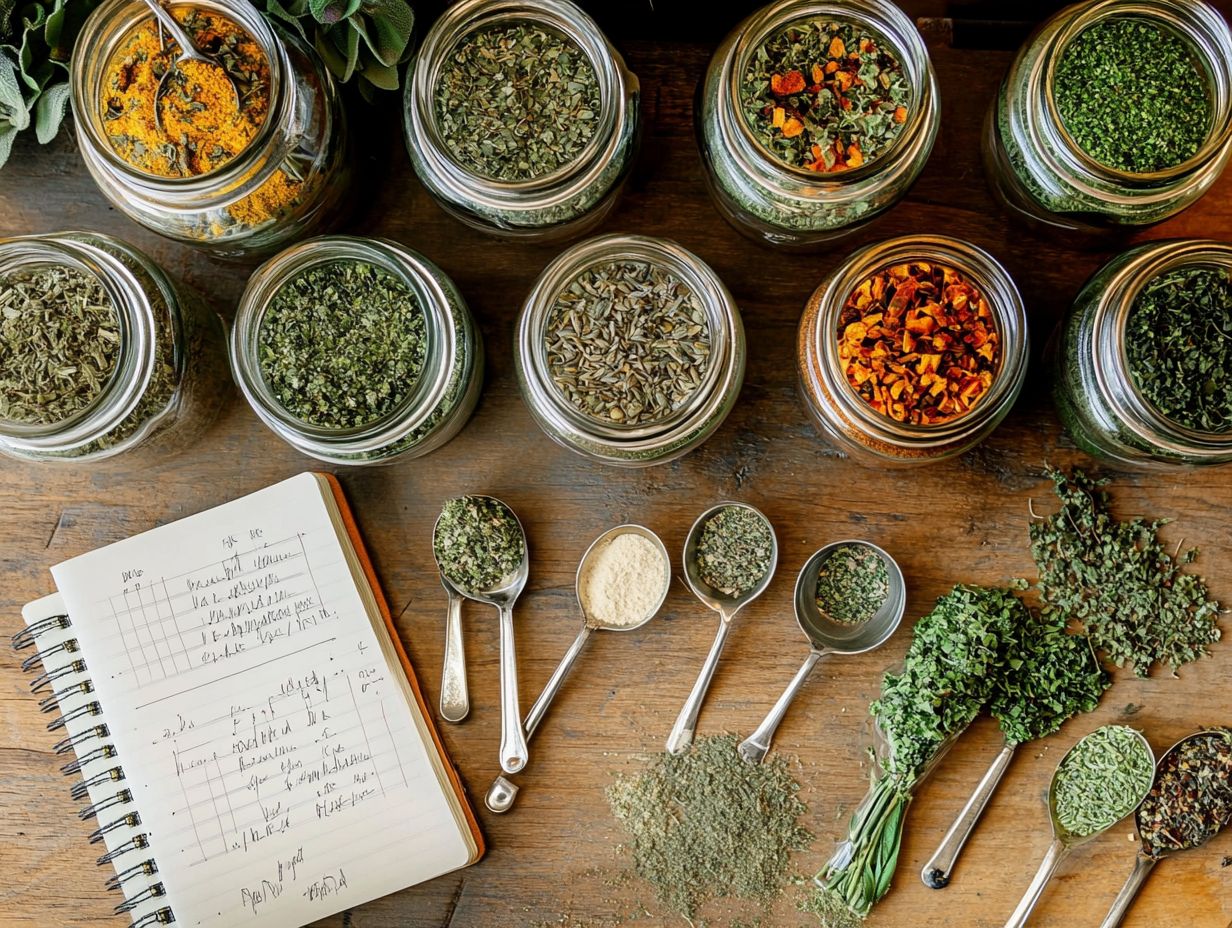
Saw Palmetto, derived from the berries of the Serenoa repens plant, is an herbal tincture celebrated for its therapeutic benefits in promoting prostate health. It is effective in managing symptoms of benign prostatic hyperplasia (an enlarged prostate that can cause urinary problems).
This natural remedy has been embraced by various cultures for generations due to its anti-inflammatory and hormonal-balancing properties. Its mechanism of action revolves around its ability to inhibit the conversion of testosterone into dihydrotestosterone (DHT), closely linked to BPH symptoms. While scientific studies have yielded mixed results, some support its effectiveness in alleviating issues like frequent urination and nocturia.
As you explore herbal solutions, prioritize quality control and safety measures. Understanding how environment affects herbal dosage safety is crucial. When supplement manufacturers adhere to these standards, they foster trust and confidence, enhancing the therapeutic potential of this remarkable herbal remedy. Always consult with a healthcare professional before starting any new supplement routine!
8. Milk Thistle
Milk Thistle comes from the Silybum marianum plant and is widely known for its protective effects on liver health. Its active compound, silymarin, is known to support liver function and aid in detoxification.
This herb has a rich history, used since ancient times for various ailments, including digestive issues and overall detoxification. Many scientific studies support these health claims, showing how silymarin can help reduce liver damage caused by toxins.
However, remember that, like any supplement, potential adverse effects such as gastrointestinal disturbances or allergic reactions should not be overlooked. Always choose high-quality products that adhere to rigorous quality assurance practices to ensure safety and benefits.
9. Eucalyptus
Eucalyptus is celebrated for its aromatic allure and is often used as a herbal tincture to enhance respiratory health. Its medicinal properties offer therapeutic benefits.
To create Eucalyptus tinctures, you soak the leaves in alcohol or glycerin, extracting valuable compounds like cineole and flavonoids. Traditionally, these tinctures help alleviate symptoms of colds, coughs, and various respiratory ailments.
The active compounds in Eucalyptus have anti-inflammatory and antiseptic qualities, making them effective. However, it s crucial to follow safety guidelines when using them; misuse can lead to adverse effects like gastrointestinal upset or skin irritations.
Understanding the proper dosages and potential interactions with other medications is essential to ensure safe and beneficial use.
10. Chamomile
Chamomile, derived from the delicate flowers of the Matricaria chamomilla plant, is a revered herbal tincture known for its calming effects and potential benefits for relaxation and sleep.
This remarkable herb has been cherished for centuries, playing a role in both traditional medicine and contemporary wellness practices. It has a rich history of applications for gastrointestinal issues, anxiety relief, and various skin disorders. To ensure safety and effectiveness, it’s important to understand evaluating herbal potency for accurate dosage.
The charm of chamomile lies in its active compounds, like apigenin and bisabolol. Scientific studies support these compounds, showcasing their anti-inflammatory, antioxidant, and sedative properties.
While chamomile offers promising benefits, always remember to follow safety guidelines. Consulting with healthcare professionals is essential, especially when considering its use with medications or during pregnancy.
Quality assurance protocols ensure that the chamomile you consume is pure and free from contaminants, enhancing its safety and efficacy.
11. Garlic
Garlic, from the Allium sativum plant, is celebrated for its many health benefits, especially in promoting cardiovascular wellness due to its rich natural substances that can have health benefits.
This remarkable bulb has served as a natural remedy for centuries, cherished for its distinctive flavor and medicinal properties. The active compound allicin is key to its health-boosting effects, including the ability to reduce blood pressure, lower cholesterol levels, and enhance overall circulation.
Scientific studies support these claims, highlighting garlic’s potential in preventing cardiovascular diseases. However, be mindful of possible adverse effects, such as digestive discomfort or allergic reactions in some individuals.
When considering garlic supplements, ensuring quality assurance is vital, as potency can vary significantly among different products. Don t miss out on garlic s amazing heart health benefits!
12. Goldenseal
Goldenseal, extracted from the Hydrastis canadensis plant, is an herbal tincture celebrated for its potential to support your immune system and its beneficial effects on various health conditions.
This remarkable herb has been cherished by Native American tribes for its extensive medicinal uses. It gained traction in the 19th century as it entered mainstream herbal medicine. Researchers have identified several active compounds within Goldenseal, with berberine often highlighted for its therapeutic properties.
While scientific studies have explored its effectiveness in combatting infections and reducing inflammation, the evidence varies, calling for further investigation.
To get the most from Goldenseal, prioritize quality control measures. This is especially important due to the herb’s potential side effects, such as gastrointestinal discomfort or interactions with other medications stemming from its natural compounds.
13. Ginger
Ginger, derived from the Zingiber officinale plant, is an exceptional herbal tincture renowned for its digestive health benefits. It s known to soothe nausea and promote overall wellness through its active compounds.
This remarkable herbal remedy has been highly regarded in traditional medicine for centuries. It does more than ease gastrointestinal discomfort; ginger also has potential anti-inflammatory and antioxidant properties that enhance your well-being.
In contemporary herbal practices, preparing ginger tincture involves steeping fresh root in alcohol or glycerin. This skillfully extracts its potent essence while preserving its natural compounds.
Scientific studies increasingly validate these age-old claims, showing ginger’s effectiveness in supporting immune function and alleviating motion sickness. Prioritizing quality control in its production is crucial to ensure your tincture is sourced from reputable suppliers and manufactured under strict safety standards.
14. Turmeric
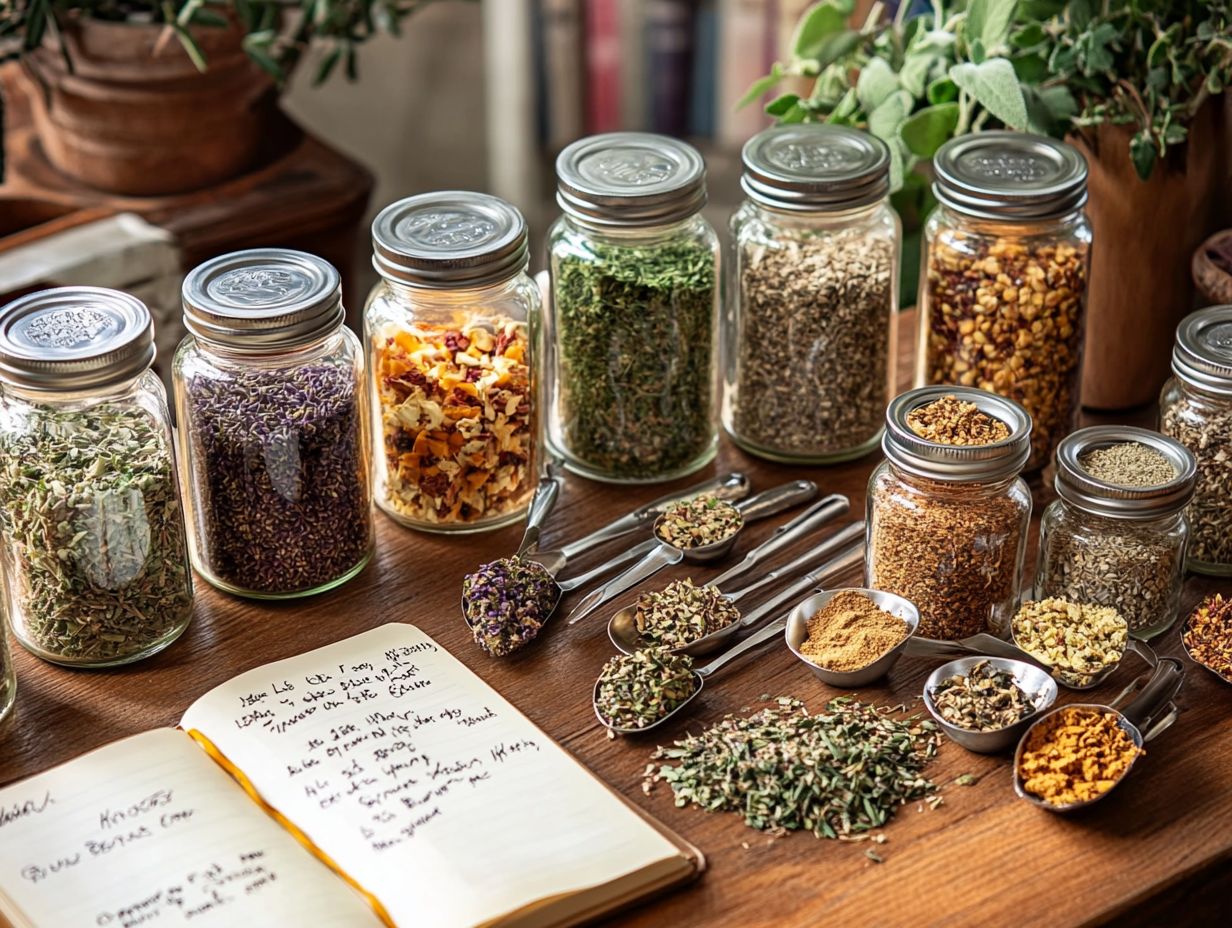
Turmeric, sourced from the root of *Curcuma longa*, is an esteemed herbal tincture celebrated for its remarkable anti-inflammatory properties and a plethora of health benefits, primarily due to its active compound, curcumin.
This vibrant yellow spice has a rich legacy in traditional medicine, especially within Ayurvedic practices, where it has been used for centuries to address ailments, from digestive troubles to skin irritations. Today, its popularity has soared in both culinary circles and among health enthusiasts, with many incorporating it into smoothies, teas, and delicious curry dishes.
Scientific research begins to validate the medicinal claims surrounding turmeric, highlighting its potential to reduce chronic inflammation and support heart health. As demand for this golden wonder increases, it s essential to stay informed about the safety standards and quality assurance processes that dictate its production. Choosing high-quality sources rich in curcumin is vital!
15. Licorice Root
Licorice Root, sourced from the Glycyrrhiza glabra plant, is an herbal tincture celebrated for its potential in promoting respiratory health and its soothing properties, thanks to its unique medicinal composition.
Historically, this remarkable herb has played a role in traditional medicine across cultures, dating back to ancient Chinese and Egyptian practices where it was commonly used to ease coughs and digestive discomfort.
The active ingredients in Licorice Root, particularly glycyrrhizin and flavonoids, have intrigued modern researchers for their anti-inflammatory and antiviral benefits.
Researchers support several health claims, including its effectiveness in treating gastric ulcers and boosting immune function. To ensure the products you choose are of the highest quality, adhere to quality assurance protocols that guarantee the purity and concentration of active ingredients.
Safety measures help minimize potential adverse effects, such as elevated blood pressure, linked to excessive consumption.
Explore more about these herbal wonders and consult with a healthcare provider to maximize their benefits by following balancing herbal remedies: dosage guidelines!
Why Is Precise Dosage Monitoring Important for These Herbs?
Precise dosage monitoring for herbal tinctures (liquid extracts from herbs) and supplements is essential for you to maximize therapeutic benefits. It also minimizes potential harm, ensuring your safety and building trust in herbal medicines.
By adhering to recommended dosages, you not only enhance the effectiveness of these products but also help avoid negative side effects that could compromise your health. Deviating from these guidelines may put you at risk, underscoring the importance of comprehensive dosing information and education.
Quality control measures are crucial; they help maintain the integrity of the products you choose. When manufacturers engage in rigorous testing and standardization, you can trust that what s claimed on the label is reliably present, fostering transparency. It’s crucial to get this right!
Gathering consumer insights is vital for understanding usage patterns, reinforcing adherence to safety standards, and ensuring a responsible approach to your herbal consumption.
What Are the Potential Risks of Incorrect Dosage?
Incorrect dosages of herbal tinctures can pose significant risks and adverse effects, underscoring the necessity of adhering to established safety standards and dosage recommendations.
For example, if you consume too much willow bark, renowned for its pain-relieving properties, you could be increasing your risk of gastrointestinal bleeding. Similarly, taking excessive amounts of kava can lead to liver damage and serious health complications. To avoid these risks, it’s crucial to understand how to measure herbal dosages accurately. Let’s not overlook St. John’s Wort; taking it in incorrect doses may negatively interact with prescription medications, resulting in side effects like nausea or fatigue.
Understanding these nuances is vital, as it ensures that herbal remedies work effectively while protecting you from unintended consequences. Act now to ensure your safety!
How Can One Ensure Proper Dosage for These Herbs?
Ensuring the proper dosage for herbal tinctures is all about adhering to dosage recommendations, grasping the specific herbal agents at play, and implementing stringent quality assurance measures to foster consumer trust.
You can take significant steps to ensure you re using the correct dosage effectively. Consulting healthcare professionals is essential; they can offer personalized advice tailored to your health conditions and specific needs.
Researching and relying on trustworthy sources for product quality is crucial. This might involve checking certifications and perusing customer reviews to gauge reliability.
Familiarizing yourself with the properties and effects of the herbs you’re taking is also advantageous, enabling you to make informed decisions. This meticulous approach not only enhances safety and efficacy but also ensures a positive herbal experience.
What Are the Different Forms of These Herbs and How Do They Affect Dosage?
The various forms of herbs tinctures, teas, and capsules can significantly influence dosage and efficacy, making it essential for you to grasp the unique characteristics and active compounds of each format.
Tinctures are quick-acting because they absorb fast. Teas are enjoyable but may take longer to work due to steeping time. Capsules offer precise doses but can take time to digest, potentially delaying their effects.
Each format comes with practical implications, such as how well they integrate into your daily routine, their palatability, and overall effectiveness. By understanding these distinctions, you enable yourself to make informed choices, ultimately maximizing the benefits of your herbal supplements.
Can These Herbs Be Used Safely with Other Medications?
Are you curious about combining herbs with your medications? It’s essential to know the interactions before diving in! The safety of using herbs alongside other medications is crucial. Carefully evaluate potential interactions and strictly adhere to safety measures.
Consulting healthcare professionals before mixing herbal supplements with prescribed medications is essential. Some herbs can increase or decrease the effects of pharmaceuticals, leading to reduced efficacy or even harmful side effects. For instance, St. John’s Wort is notorious for interfering with several medications, including antidepressants and birth control pills. This highlights the importance of being aware of such interactions and considering dosage recommendations for popular herbs.
The quality of herbal products can differ greatly, impacting their safety and effectiveness. By seeking professional advice, you empower yourself to make informed choices, especially regarding herbal remedies dosage tips for older adults, promoting better health outcomes and avoiding unnecessary risks.
Frequently Asked Questions
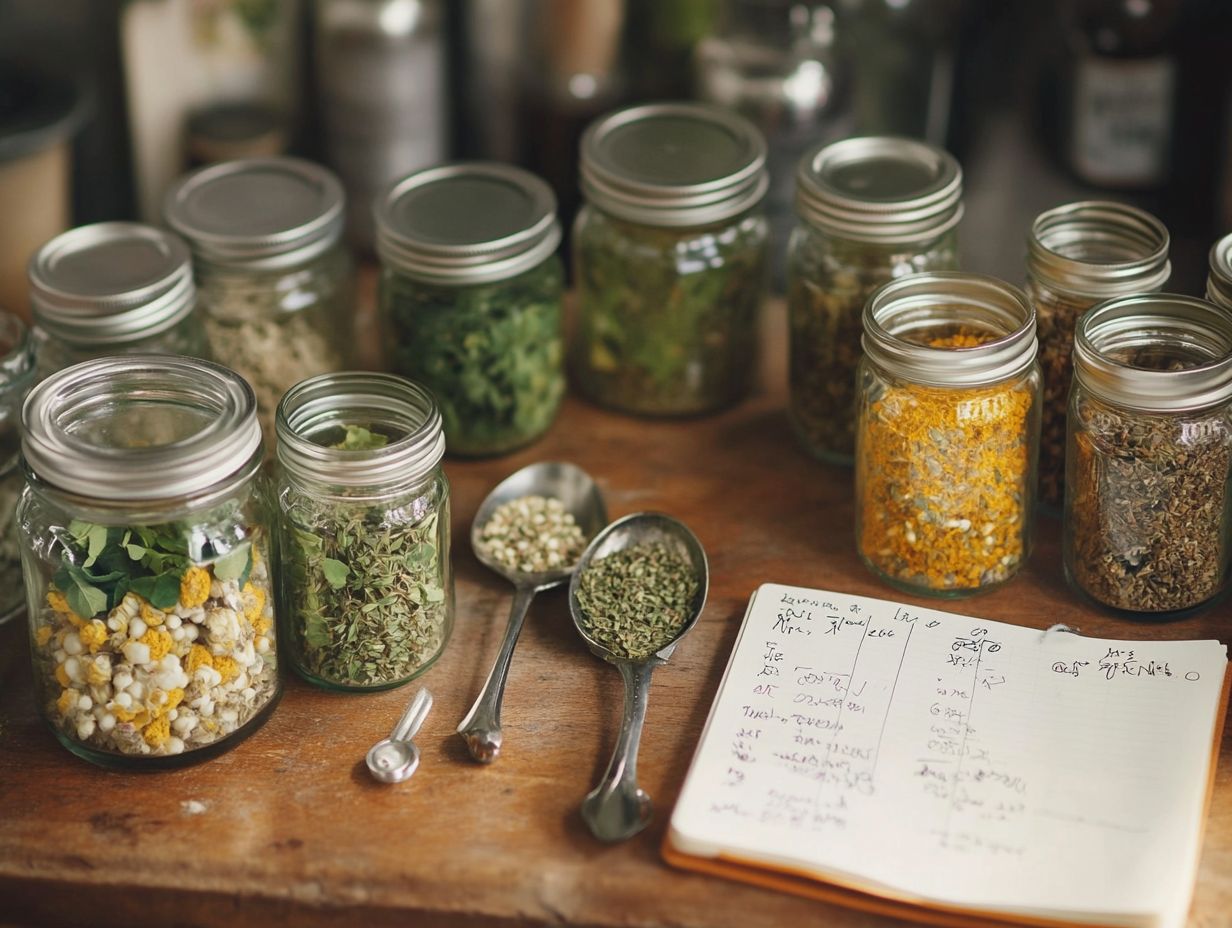
1. What are some examples of herbs that require precise dosage monitoring?
Examples include St. John’s Wort, valerian root, ginkgo biloba, and kava kava.
2. Why is it important to monitor the dosage of these herbs?
These herbs can cause negative reactions if taken in incorrect dosages, so monitoring and following recommended dosages is crucial to avoid harm.
3. What can happen if I take too much of these herbs?
Taking excessive amounts can lead to side effects such as dizziness, nausea, vomiting, and even liver damage in some cases.
4. Are there any specific populations who may be more sensitive to these herbs?
Yes, pregnant or breastfeeding women, children, and individuals with certain medical conditions may be more sensitive to these herbs and require even more precise dosage monitoring.
5. Can I mix these herbs with other medications?
It’s important to consult with a healthcare provider before mixing these herbs with any medications, as they can interact and impact medication effectiveness.
6. What should I do if I accidentally take too much of these herbs?
If you think you’ve taken too much, act quickly and seek medical attention. Be transparent with your healthcare provider about any herbs or supplements you are taking to ensure proper treatment.

